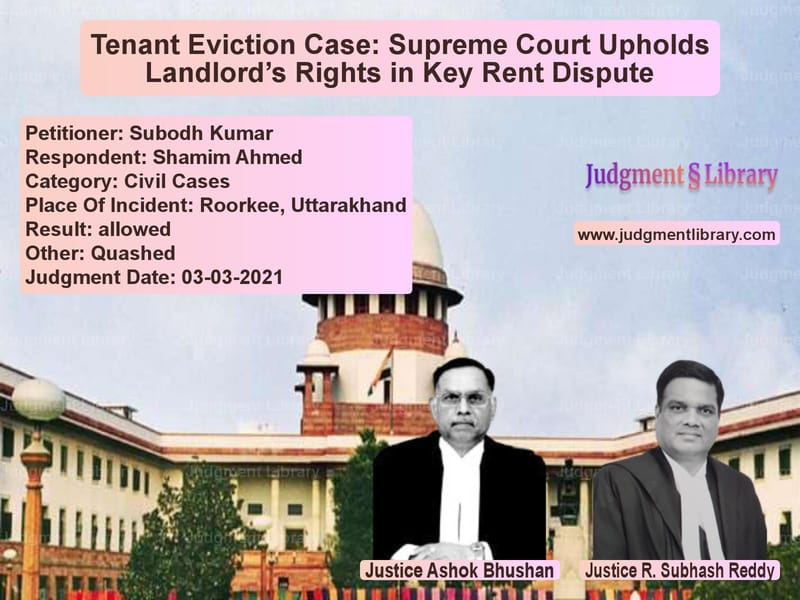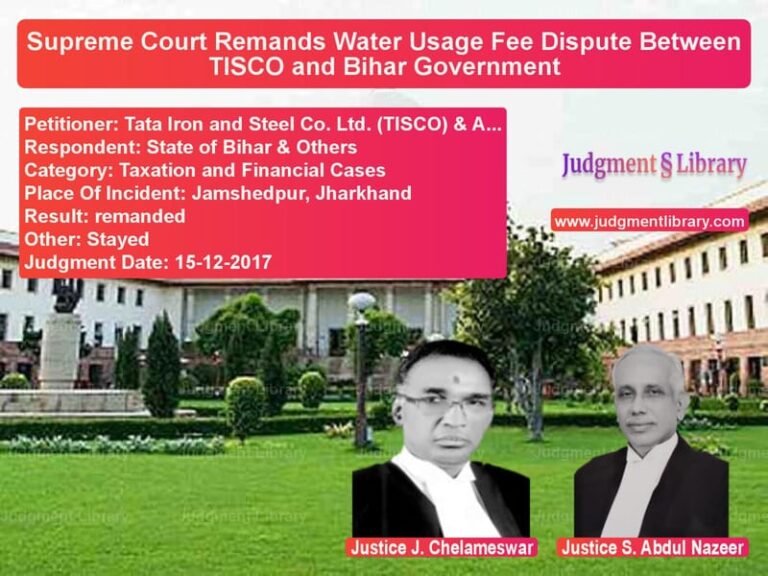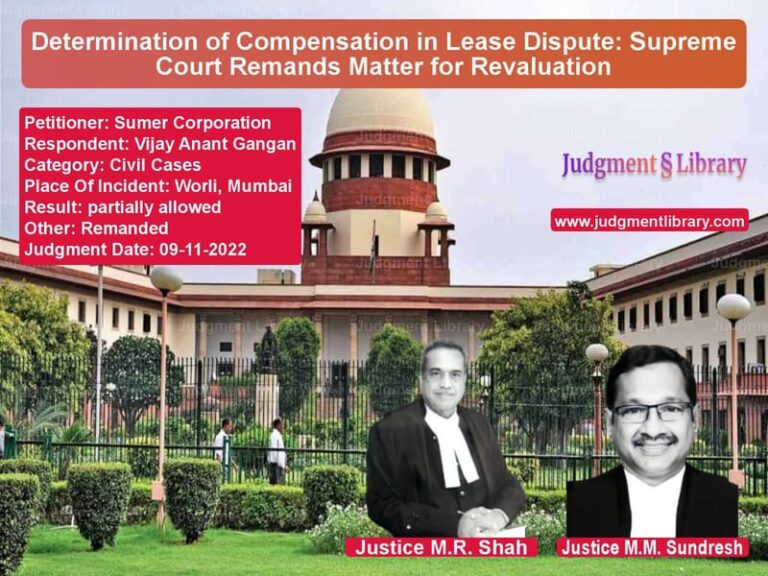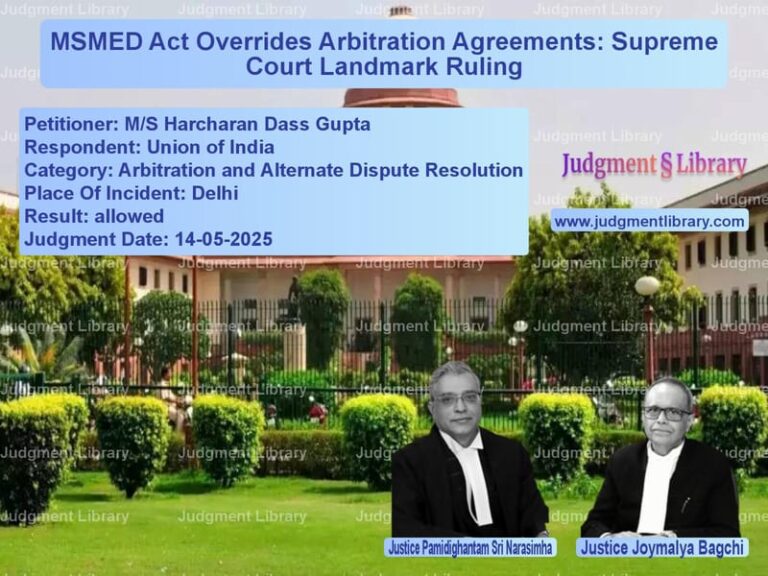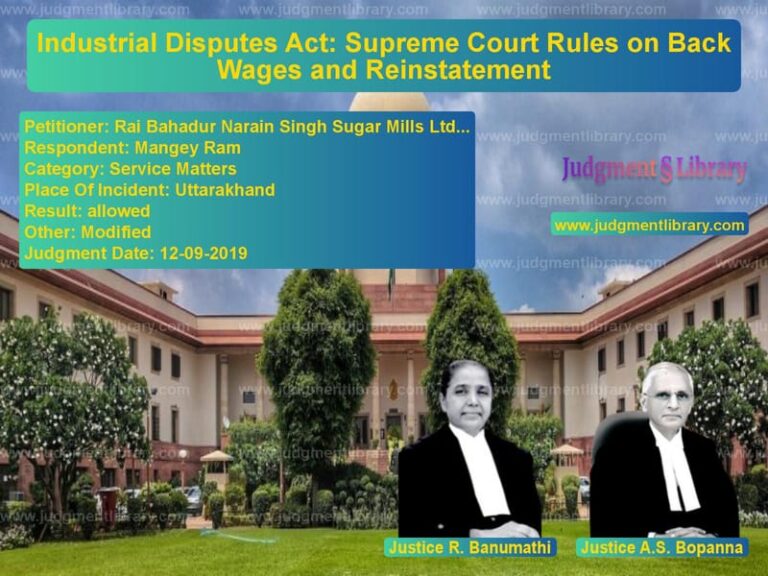Tenant Eviction Case: Supreme Court Upholds Landlord’s Rights in Key Rent Dispute
The case of Subodh Kumar vs. Shamim Ahmed is a crucial ruling by the Supreme Court of India regarding the interpretation of tenancy laws, eviction procedures, and procedural requirements under the Provincial Small Cause Courts Act, 1887. The dispute revolved around the eviction of a tenant from a shop in Roorkee, Uttarakhand, where the tenant had failed to comply with legal obligations regarding rent payment and procedural rules for challenging an ex-parte decree.
The key legal question in this case was whether the tenant, Shamim Ahmed, had met the mandatory requirement under Section 17 of the Provincial Small Cause Courts Act, 1887, which mandates that an applicant seeking to set aside an ex-parte decree must deposit the entire decretal amount or provide security. The Supreme Court ultimately ruled in favor of the landlord, Subodh Kumar, setting aside the Uttarakhand High Court’s decision that had favored the tenant.
Background of the Case
The dispute related to a shop located in Compound No. 3, Civil Lines, Roorkee, District Haridwar. The appellant, Subodh Kumar, had purchased the shop in 1991 and sought eviction of the respondent-tenant, Shamim Ahmed, on the grounds of non-payment of rent.
- The landlord issued a notice on 24.12.1993, demanding outstanding rent.
- On 18.03.1994, the landlord filed an eviction suit (SCC Case No. 4 of 1994).
- The tenant repeatedly delayed filing a written statement and sought multiple adjournments.
- On 24.02.1997, the trial court passed an ex-parte decree against the tenant due to continued non-appearance.
- The tenant later filed an application under Order 9 Rule 13 CPC to set aside the ex-parte decree, but without depositing the entire decretal amount as required by law.
Legal Issues Raised
1. Compliance with Section 17 of the Provincial Small Cause Courts Act, 1887
The primary issue was whether the tenant had complied with Section 17, which mandates:
- Deposit of the full decretal amount at the time of filing an application to set aside an ex-parte decree.
- Alternatively, a prior application seeking court permission to furnish security instead of making the deposit.
The Supreme Court found that the tenant had neither deposited the full amount nor obtained permission to furnish security.
2. Validity of Rent Deposits under Section 30(2) of the UP Urban Buildings Act, 1972
The tenant argued that he had already deposited some rent amounts under Section 30(2) of the Uttar Pradesh Urban Buildings (Regulation of Letting, Rent and Eviction) Act, 1972. The Supreme Court, however, ruled that:
- The landlord had claimed exemption from the applicability of the UP Urban Buildings Act.
- Since the applicability of the Act was in dispute, the tenant’s deposit under Section 30(2) could not be considered compliance with Section 17 of the Provincial Small Cause Courts Act.
3. Whether the Tenant Had Acted in Bad Faith
The Supreme Court observed that the tenant had repeatedly delayed legal proceedings:
- He failed to file a written statement within the stipulated time.
- His application to recall the ex-parte order was dismissed on grounds of bad faith.
- The trial court had previously noted that he was deliberately prolonging the case.
Supreme Court’s Observations
The Supreme Court, after reviewing the facts and legal provisions, made the following key observations:
- The tenant’s application under Order 9 Rule 13 CPC was invalid as it did not comply with Section 17.
- The High Court had erred in granting relief to the tenant despite his failure to meet procedural requirements.
- The tenant had made deliberate attempts to delay proceedings, justifying the rejection of his application.
- Section 30(2) deposits could not be considered for compliance with Section 17 since the applicability of the UP Urban Buildings Act was disputed.
Final Verdict
The Supreme Court ruled in favor of the landlord, setting aside the High Court’s judgment and upholding the trial court’s decision. The Court also directed:
- The immediate execution of the eviction decree.
- The tenant to pay the entire outstanding rent and mesne profits.
- The tenant to bear a cost of Rs. 25,000 to be paid to the landlord.
Implications of the Judgment
This ruling has significant implications for tenancy laws and eviction procedures in India. It establishes the following key principles:
- Tenants must strictly comply with procedural laws when seeking to challenge eviction orders.
- Court deposits under different tenancy laws cannot be arbitrarily used to fulfill separate legal requirements.
- Deliberate delays by tenants can lead to adverse rulings and rejection of their applications.
- Landlords are entitled to swift enforcement of eviction orders when tenants fail to comply with legal obligations.
By affirming the importance of procedural compliance and rejecting undue leniency for tenants who act in bad faith, the Supreme Court has strengthened the enforcement of tenancy laws in India.
Petitioner Name: Subodh Kumar.Respondent Name: Shamim Ahmed.Judgment By: Justice Ashok Bhushan, Justice R. Subhash Reddy.Place Of Incident: Roorkee, Uttarakhand.Judgment Date: 03-03-2021.
Don’t miss out on the full details! Download the complete judgment in PDF format below and gain valuable insights instantly!
Download Judgment: subodh-kumar-vs-shamim-ahmed-supreme-court-of-india-judgment-dated-03-03-2021.pdf
Directly Download Judgment: Directly download this Judgment
See all petitions in Landlord-Tenant Disputes
See all petitions in Property Disputes
See all petitions in Damages and Compensation
See all petitions in Judgment by Ashok Bhushan
See all petitions in Judgment by R. Subhash Reddy
See all petitions in allowed
See all petitions in Quashed
See all petitions in supreme court of India judgments March 2021
See all petitions in 2021 judgments
See all posts in Civil Cases Category
See all allowed petitions in Civil Cases Category
See all Dismissed petitions in Civil Cases Category
See all partially allowed petitions in Civil Cases Category

